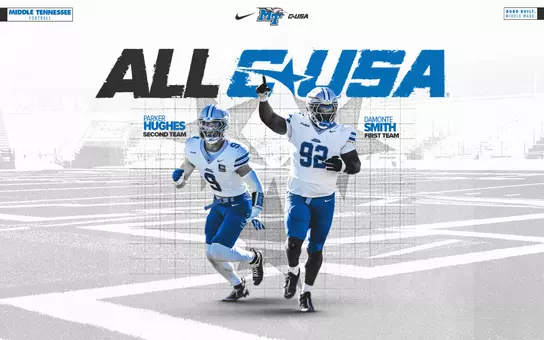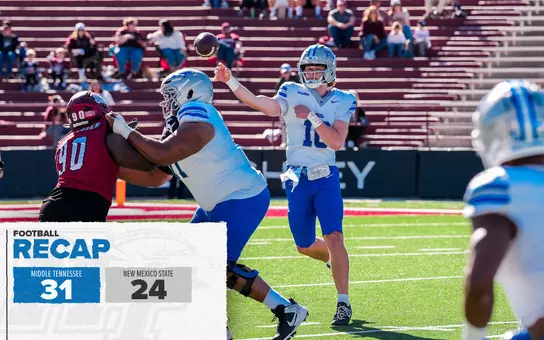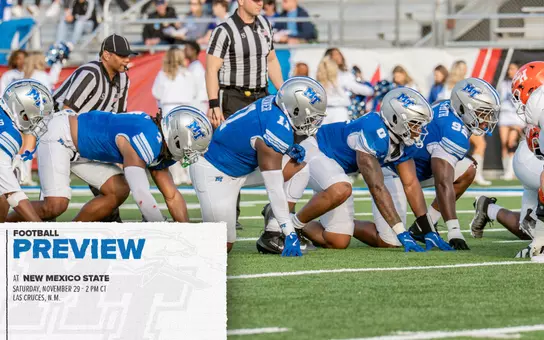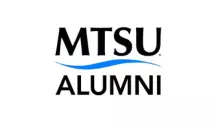Middle Tennessee State University Athletics
Future of College Football Solved (or at least, discussed) at True Blue Town Hall
7/21/2022 12:05:00 PM | Football, General, BRAA
MTSU alums Jonathan Hutton, Chase McCabe and Joe Dubin joined Chris Massaro on the Blue Raider Blitz stage
NASHVILLE — Wednesday night at the Listening Room Café was like being on radio row at the Super Bowl, or just putting your car radio on its scanning mode on a drive through Nashville, whichever floats your boat. As attendees at the Nashville stop on the 2022 Blue Raider Blitz were treated to an hour of riveting discussion surrounding the future of college sports by Blue Raiders past and present.
Alongside Director of Athletics Chris Massaro and Voice of the Blue Raiders Chip Walters, OutKick 360's Jonathan Hutton, 102.5 The Game's Chase McCabe and "Mornings on Main Street" host Joe Dubin, all alumni of Middle Tennessee State University, joined together to discuss the future of college sports from their perch in the media market, and from Massaro's at the helm of MTSU Athletics.
The whole conversation was among the most compelling podcasts this writer has ever heard, live or otherwise. Here are a few of the highlights from the wide-ranging conversation.
Conference Realignment
Football head coach Rick Stockstill set the tone early on regarding conference realignment during his preliminary remarks ahead of the town hall itself, stating "I don't think anybody has got an answer on conference realignment. It's not going to stop, it's not close to being over with."
A sentiment that was readily agreed upon by all four panelists once they took the stage, perhaps best summed up by McCabe's first comment of the evening: "College sports has changed so much in the last five, 10, 20 years, that you don't know what it's going to look like in two years, let along five or 10. In some ways, that's exciting. In some ways, that's scary. I don't envy Chris and his job of trying to navigate those waters."
The Big Ten's summer additions of UCLA and USC once again has started up the conference realignment discussion, with Massaro estimating he spends almost half his day either talking to someone about realignment, answering questions for someone about realignment, or just searching for his own answers on what the latest news might be. Massaro was pleased, however, to see that the latest domino to fall has not forced anyone into actions that might be rash yet, though he understands how that happens.
"The bad part of it is it feels like a rapture moment," Massaro said, describing how schools that aren't moving in that first wave feel when the first movement happens. The Director of Athletics added that it's easy to make a rash decision, often because of pressure from your fan base to make sure you're not left behind. "I'm really glad that it appears on the outside that some of those leagues are taking a deep breath and coming back and just reevaluating their situation. I think what has happened in the past is a sense of panic starts to come over some of these leagues and they make some really questionable decisions, in my view, on expansion."
Dubin, true to his Main Street roots, and his history as a former Blue Raider lettermen in football, pointed out that at some point, it doesn't matter what some of the bigger schools do in forming these super conferences, because ultimately, he just wants to enjoy a Saturday afternoon kickoff in Johnny "Red" Floyd Stadium.
"At some point, I get tired of 'What's Oklahoma going to do? What's Clemson going to do?' Just take me to Murfreesboro on Saturday," Dubin said. "Let the leagues swallow each other. But I just want to see football, I'm going to go to Murfreesboro and watch MTSU play."
On a broader note, Massaro closed out the conference realignment discussion with a warning after comments made by SEC Commissioner Greg Sankey at SEC Media Days earlier this week opposing automatic bids to the College Football Playoff when the contract is up for renegotiation, pointing out that line of logic doesn't stop there.
"I'm scared to death for the NCAA Basketball Tournament when you hear some of the commissioners talking about how maybe we shouldn't have as many automatic berths," Massaro said.
Group of Five College Football Playoff?
McCabe has probably the most intriguing proposal of the evening for the crowd in attendance, advocating that the Group of Five (made up of schools in Conference USA, the Sun Belt, Mountain West, MAC and American Athletic) should form their own playoff separate from the machinations of the other conferences at the FBS level.
"We see it in high school football with having different divisions of champion," McCabe said. "I think college sports is probably going in that direction, outside of just D-I, D-II etc."
Massaro countered with the fact the current CFP contract allocates $80 million dollars to the Group of Five conferences, which does matriculate down to the schools and helps with their budgets. The economics of the G5 separating themselves would have to be worked out before such a tournament were to be formed.
Name, Image and Likeness
All four panelists lamented the "Wild West" that has formed around NIL deals in the college sports world, while acknowledging the reality that each school would need to find a way to adapt to current NIL rules or be left behind.
"You know it's bad when Lane Kiffin complains about it," Hutton joked for the crowd. "If you don't lean into it and accept it and adapt to it, the problem is that you will be passed by someone you lapped a long time ago."
Massaro said that Name, Image and Likeness rights for student athletes was the "pandora's box" that many athletic administrators around the country warned about for years, while also pointing out that the lack of guardrails put in place was a factor of two different dynamics. One being the legal jeopardy of potential regulating the enterprise (in reference to the NCAA v. Alston Supreme Court case that preceded so much of this change), but also the fact that many schools that might be in a power conference, but aren't the richest or biggest team in said conference, had lost interest in creating regulations to protect their own interests.
As an example, Massaro said that he remembers regulations that were in place when he was on the administrative staff at South Carolina regarding the size of media guides, particularly how much color could be used on them. A minor regulation, to be sure, but one put in place not to protect schools like Middle from Alabama, but schools like South Carolina from Texas.
"Some of those schools have lost that focus of wanting to fight above their weight class," Massaro said. "With these rules, it's just going to be those superpowers have the advantage in the NIL game."
Hutton predicted that there will be an NIL "regression to the mean" at some point in the future, in part due to deals going bad, either from athletes not receiving what they are owed or those offering these deals not finding as much value as they would've hoped to find. But mainly due to legislation that is being worked on both in Washington D.C. and at State Houses across the country, particularly in SEC and Big Ten Country.
Massaro was less bullish on national solutions, saying that he's hearing the philosophical divide between Republicans and Democrats on this issue, namely discussions surrounding guaranteeing healthcare for student athletes as a part of NIL legislation, might be too big to overcome, particularly in a mid-term election year. But he thought working through the issue at the state level might be the most effective method to get a legislative fix.
Until then, however, Dubin again has the money quote on another topic: "There's plenty of answers, there's no solutions."
Build Blue Now
Wrapping things up with some MTSU based excitement, both McCabe and Hutton discussed how important the Build Blue Now campaign breaking ground before the end of the year will be for MTSU. Both for the program itself, but also for its status in a competitive Nashville media market.
"What I love about what MTSU has done is that the school I went to and graduated from 10 years ago is a very different looking school, because they're constantly growing," McCabe said, pointing out that such a growth plan is not cheap to produce.
Hutton took the chance to relish his alma mater's progress compared to a mid-state rival.
"It was last summer when Vandy put out a press release that they had $300 million set aside for athletics," Hutton said. "I've not seen one shovel or hard hat on any picture. So, the minute they break ground on this facility after the football season, you better believe I'll be shouting to the moon that Middle is way ahead of Vanderbilt on delivering on any promise that they make to their fan base."
Want to check out more?
There's plenty more to be garnered from last night's Town Hall, including speculation on who might replace Mark Emmert as president of the NCAA, excitement about Blue Raider football's season opener against Tennessee State, and much much more we couldn't cover here.
If you missed all the fun in Nashville, check out the video of the panel here: True Blue Town Hall - 2022 Blue Raider Blitz (Nashville).
Alongside Director of Athletics Chris Massaro and Voice of the Blue Raiders Chip Walters, OutKick 360's Jonathan Hutton, 102.5 The Game's Chase McCabe and "Mornings on Main Street" host Joe Dubin, all alumni of Middle Tennessee State University, joined together to discuss the future of college sports from their perch in the media market, and from Massaro's at the helm of MTSU Athletics.
The whole conversation was among the most compelling podcasts this writer has ever heard, live or otherwise. Here are a few of the highlights from the wide-ranging conversation.
Conference Realignment
Football head coach Rick Stockstill set the tone early on regarding conference realignment during his preliminary remarks ahead of the town hall itself, stating "I don't think anybody has got an answer on conference realignment. It's not going to stop, it's not close to being over with."
A sentiment that was readily agreed upon by all four panelists once they took the stage, perhaps best summed up by McCabe's first comment of the evening: "College sports has changed so much in the last five, 10, 20 years, that you don't know what it's going to look like in two years, let along five or 10. In some ways, that's exciting. In some ways, that's scary. I don't envy Chris and his job of trying to navigate those waters."
The Big Ten's summer additions of UCLA and USC once again has started up the conference realignment discussion, with Massaro estimating he spends almost half his day either talking to someone about realignment, answering questions for someone about realignment, or just searching for his own answers on what the latest news might be. Massaro was pleased, however, to see that the latest domino to fall has not forced anyone into actions that might be rash yet, though he understands how that happens.
"The bad part of it is it feels like a rapture moment," Massaro said, describing how schools that aren't moving in that first wave feel when the first movement happens. The Director of Athletics added that it's easy to make a rash decision, often because of pressure from your fan base to make sure you're not left behind. "I'm really glad that it appears on the outside that some of those leagues are taking a deep breath and coming back and just reevaluating their situation. I think what has happened in the past is a sense of panic starts to come over some of these leagues and they make some really questionable decisions, in my view, on expansion."
Dubin, true to his Main Street roots, and his history as a former Blue Raider lettermen in football, pointed out that at some point, it doesn't matter what some of the bigger schools do in forming these super conferences, because ultimately, he just wants to enjoy a Saturday afternoon kickoff in Johnny "Red" Floyd Stadium.
"At some point, I get tired of 'What's Oklahoma going to do? What's Clemson going to do?' Just take me to Murfreesboro on Saturday," Dubin said. "Let the leagues swallow each other. But I just want to see football, I'm going to go to Murfreesboro and watch MTSU play."
On a broader note, Massaro closed out the conference realignment discussion with a warning after comments made by SEC Commissioner Greg Sankey at SEC Media Days earlier this week opposing automatic bids to the College Football Playoff when the contract is up for renegotiation, pointing out that line of logic doesn't stop there.
"I'm scared to death for the NCAA Basketball Tournament when you hear some of the commissioners talking about how maybe we shouldn't have as many automatic berths," Massaro said.
Group of Five College Football Playoff?
McCabe has probably the most intriguing proposal of the evening for the crowd in attendance, advocating that the Group of Five (made up of schools in Conference USA, the Sun Belt, Mountain West, MAC and American Athletic) should form their own playoff separate from the machinations of the other conferences at the FBS level.
"We see it in high school football with having different divisions of champion," McCabe said. "I think college sports is probably going in that direction, outside of just D-I, D-II etc."
Massaro countered with the fact the current CFP contract allocates $80 million dollars to the Group of Five conferences, which does matriculate down to the schools and helps with their budgets. The economics of the G5 separating themselves would have to be worked out before such a tournament were to be formed.
Name, Image and Likeness
All four panelists lamented the "Wild West" that has formed around NIL deals in the college sports world, while acknowledging the reality that each school would need to find a way to adapt to current NIL rules or be left behind.
"You know it's bad when Lane Kiffin complains about it," Hutton joked for the crowd. "If you don't lean into it and accept it and adapt to it, the problem is that you will be passed by someone you lapped a long time ago."
Massaro said that Name, Image and Likeness rights for student athletes was the "pandora's box" that many athletic administrators around the country warned about for years, while also pointing out that the lack of guardrails put in place was a factor of two different dynamics. One being the legal jeopardy of potential regulating the enterprise (in reference to the NCAA v. Alston Supreme Court case that preceded so much of this change), but also the fact that many schools that might be in a power conference, but aren't the richest or biggest team in said conference, had lost interest in creating regulations to protect their own interests.
As an example, Massaro said that he remembers regulations that were in place when he was on the administrative staff at South Carolina regarding the size of media guides, particularly how much color could be used on them. A minor regulation, to be sure, but one put in place not to protect schools like Middle from Alabama, but schools like South Carolina from Texas.
"Some of those schools have lost that focus of wanting to fight above their weight class," Massaro said. "With these rules, it's just going to be those superpowers have the advantage in the NIL game."
Hutton predicted that there will be an NIL "regression to the mean" at some point in the future, in part due to deals going bad, either from athletes not receiving what they are owed or those offering these deals not finding as much value as they would've hoped to find. But mainly due to legislation that is being worked on both in Washington D.C. and at State Houses across the country, particularly in SEC and Big Ten Country.
Massaro was less bullish on national solutions, saying that he's hearing the philosophical divide between Republicans and Democrats on this issue, namely discussions surrounding guaranteeing healthcare for student athletes as a part of NIL legislation, might be too big to overcome, particularly in a mid-term election year. But he thought working through the issue at the state level might be the most effective method to get a legislative fix.
Until then, however, Dubin again has the money quote on another topic: "There's plenty of answers, there's no solutions."
Build Blue Now
Wrapping things up with some MTSU based excitement, both McCabe and Hutton discussed how important the Build Blue Now campaign breaking ground before the end of the year will be for MTSU. Both for the program itself, but also for its status in a competitive Nashville media market.
"What I love about what MTSU has done is that the school I went to and graduated from 10 years ago is a very different looking school, because they're constantly growing," McCabe said, pointing out that such a growth plan is not cheap to produce.
Hutton took the chance to relish his alma mater's progress compared to a mid-state rival.
"It was last summer when Vandy put out a press release that they had $300 million set aside for athletics," Hutton said. "I've not seen one shovel or hard hat on any picture. So, the minute they break ground on this facility after the football season, you better believe I'll be shouting to the moon that Middle is way ahead of Vanderbilt on delivering on any promise that they make to their fan base."
Want to check out more?
There's plenty more to be garnered from last night's Town Hall, including speculation on who might replace Mark Emmert as president of the NCAA, excitement about Blue Raider football's season opener against Tennessee State, and much much more we couldn't cover here.
If you missed all the fun in Nashville, check out the video of the panel here: True Blue Town Hall - 2022 Blue Raider Blitz (Nashville).
MTSU Men's Basketball Post Game Press Conference vs Belmont 12/7/25
Monday, December 08
MTSU Women's Basketball vs. Memphis Postgame Press Conference on 12/07/25
Sunday, December 07
MTSU Men's Basketball Cinematic Recap vs UAB
Friday, December 05
MTSU Football Signing Day Press Conference 1/3/25
Wednesday, December 03


















